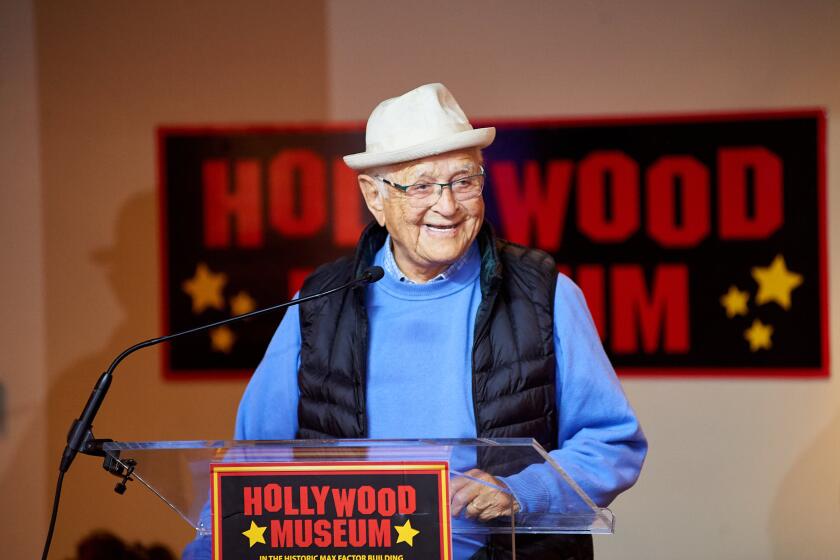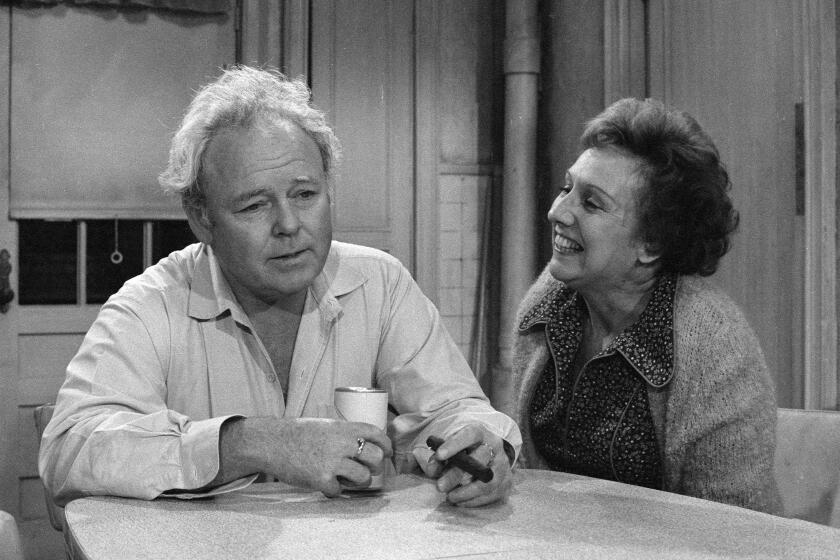Norman Lear, who revolutionized prime-time TV with ‘All in the Family,’ dies
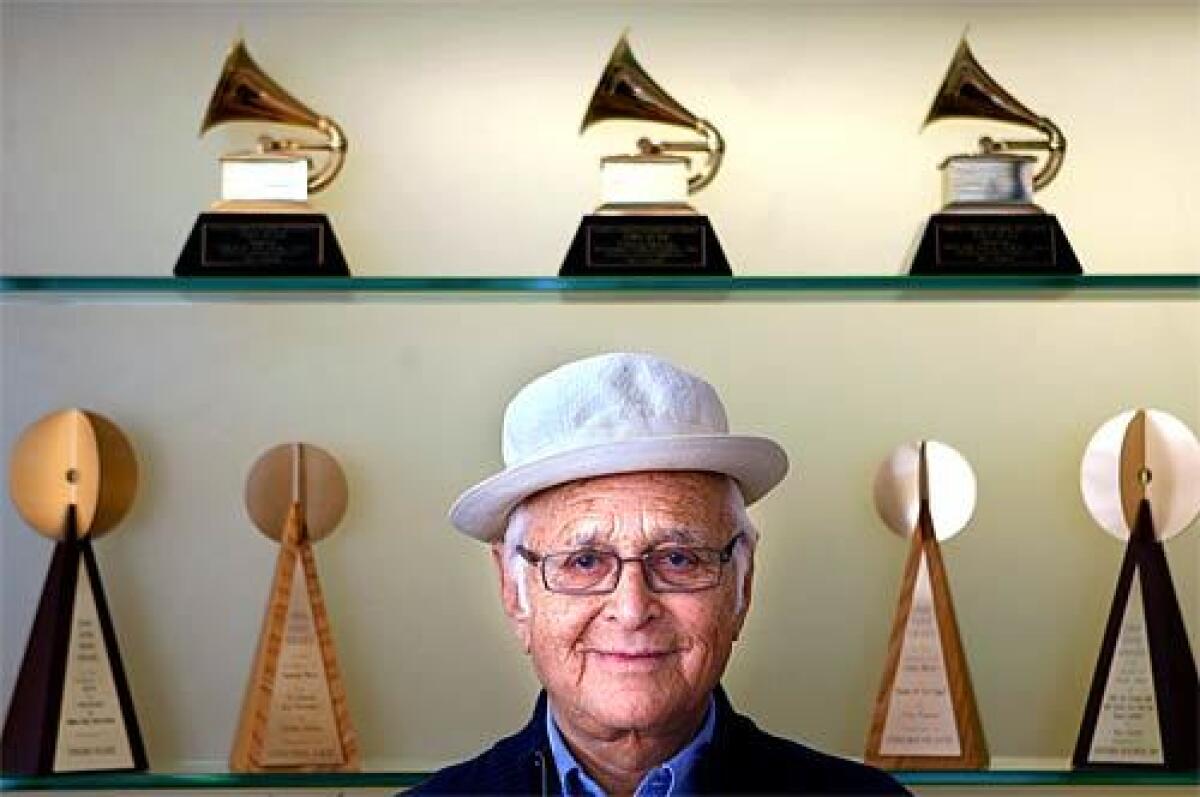
- Share via
Norman Lear, the multiple Emmy-Award-winning writer-producer and liberal political activist who revolutionized prime-time television in the 1970s with groundbreaking, socially relevant situation comedies such as “All in the Family,” “Maude” and “The Jeffersons,” has died. He was 101.
One of the most successful and influential producers in television history, Lear died Tuesday at his home in Los Angeles, said his publicist, Lara Bergthold.
In the mid-1970s, it was estimated that some 120 million Americans — more than half the nation’s population at the time— watched the various sitcoms produced by Lear and Bud Yorkin, his longtime partner in Tandem Productions. Indeed, Lear and Yorkin had five of the top 10 programs in the Nielsen ratings for the 1974-75 TV season.
Lear’s success as a television producer and show developer was such that after he accepted an Emmy for “All in the Family” as outstanding comedy series in 1972 — one of seven Emmys the landmark show won that year — Johnny Carson quipped: “I understand Norman has just sold his acceptance speech as a new series.”
Times writers, editors and critics remember Norman Lear and programs such as “All in the Family,” “The Jeffersons,” “Mary Hartman, Mary Hartman” and the Netflix reboot of “One Day at a Time.”
Along with his reputation as a prolific television producer, Lear earned praise and condemnation as a TV trailblazer whose sitcoms toppled taboos in their treatment of controversial topics such as LGBTQ+ rights, abortion and infidelity.
“Norman Lear has held up a mirror to American society and changed the way we look at it,” President Clinton said when Lear received the National Medal of Arts in 1999.
Lear, whose resume included three years writing for Dean Martin and Jerry Lewis on “The Colgate Comedy Hour” in the early 1950s, teamed with director and producer Yorkin in late 1958 and formed Tandem Productions.
Rob Reiner, Kerry Washington, Jimmy Kimmel and Rita Moreno were among the actors and producers to shared their condolences and appreciation for legendary TV writer and producer Norman Lear, who died Tuesday at 101.
Over the next decade, they executive-produced “The Andy Williams Show” and produced TV specials that were written by Lear and directed by Yorkin, including ones starring Bobby Darin, Danny Kaye and Henry Fonda.
They also made half a dozen movies, including the Yorkin-directed “Divorce American Style” (which earned Lear an Oscar nomination for his screenplay) and “Cold Turkey” (which Lear wrote, produced and directed).
Then came “All in the Family,” a situation comedy unlike any that had preceded it on American TV.
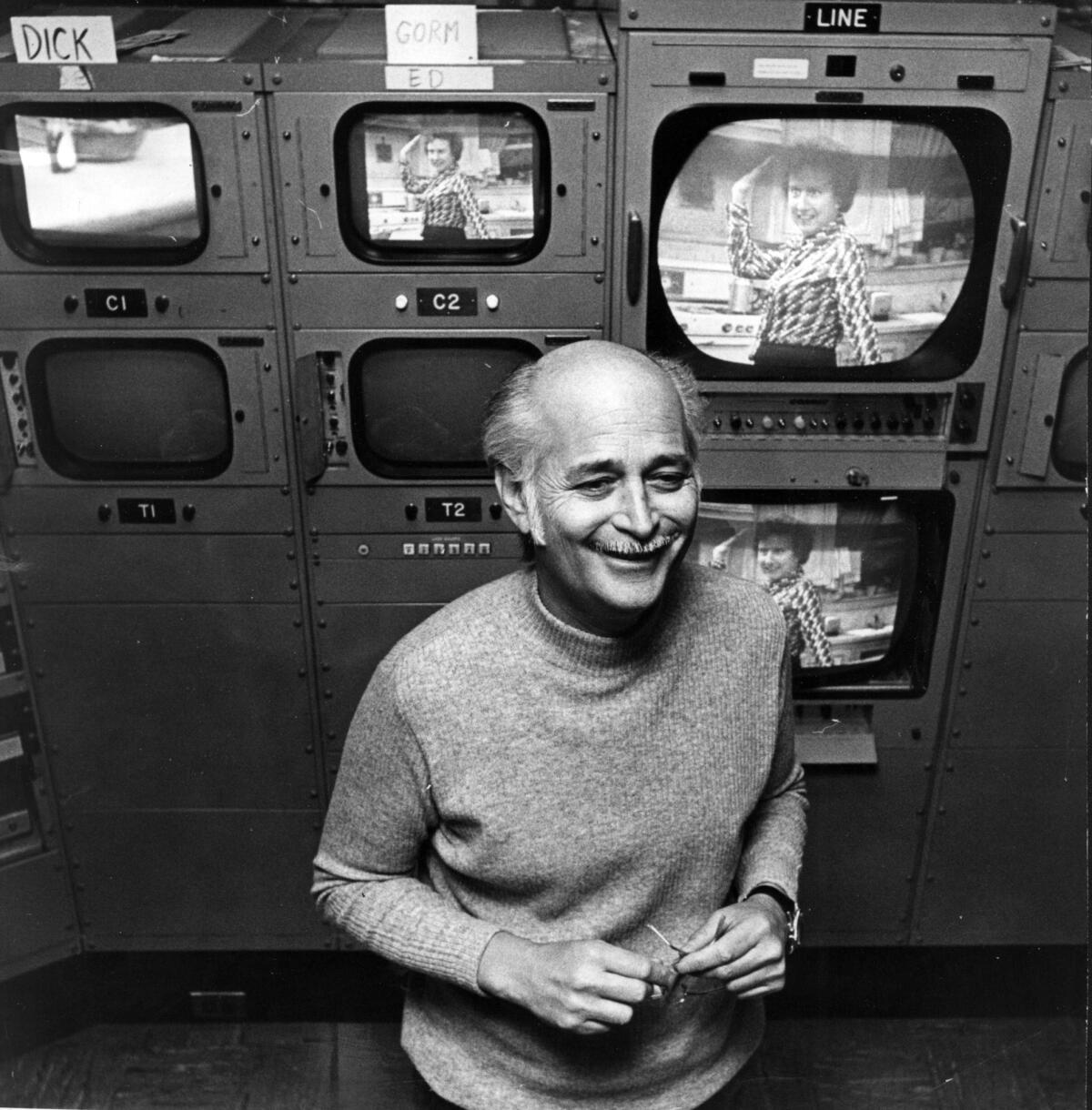
Yorkin said in interviews that he saw a hit British sitcom called “Till Death Us Do Part” and was so blown away that he sent Lear a copy of the controversial show, whose reactionary and bigoted working-class main character constantly argued with his young, left-wing son-in-law.
The British show’s two verbally sparring male characters struck a chord with Lear, who recalled having similar battles with his own father.
Lear’s father, Herman, also was known to punctuate noisy arguments with Lear’s mother by yelling at her, “Jeanette, stifle! Will you stifle yourself?”
“I was flooded with ideas,” Lear wrote in his book, “and knew I had to do an American version of this show.”
Whether you’re figuring out where to start or where to catch up with your old favorites, here are Norman Lear’s 7 most essential TV shows and where to watch them.
Tandem Productions obtained the rights to the British series, and Lear wrote a script for a pilot commissioned by ABC that introduced the soon-to-be-famous working-class family living in the New York City borough of Queens, with Carroll O’Connor cast as the bigoted, opinionated and relentlessly argumentative Archie Bunker and Jean Stapleton as his loving, sweet-natured wife, Edith.
The taping of the 1968 pilot generated big laughs from the live studio audience, but ABC passed on it, as well as a second pilot made for the network in 1969, deciding that the show’s potentially offensive language and content would be inappropriate in a country already in turmoil over the increasingly unpopular Vietnam War, racism and the emerging feminist movement.
CBS seized the moment. And, despite the network’s own concerns and a commitment for only 13 episodes, “All in the Family” debuted as a midseason replacement on Jan. 12, 1971 — a Tuesday.
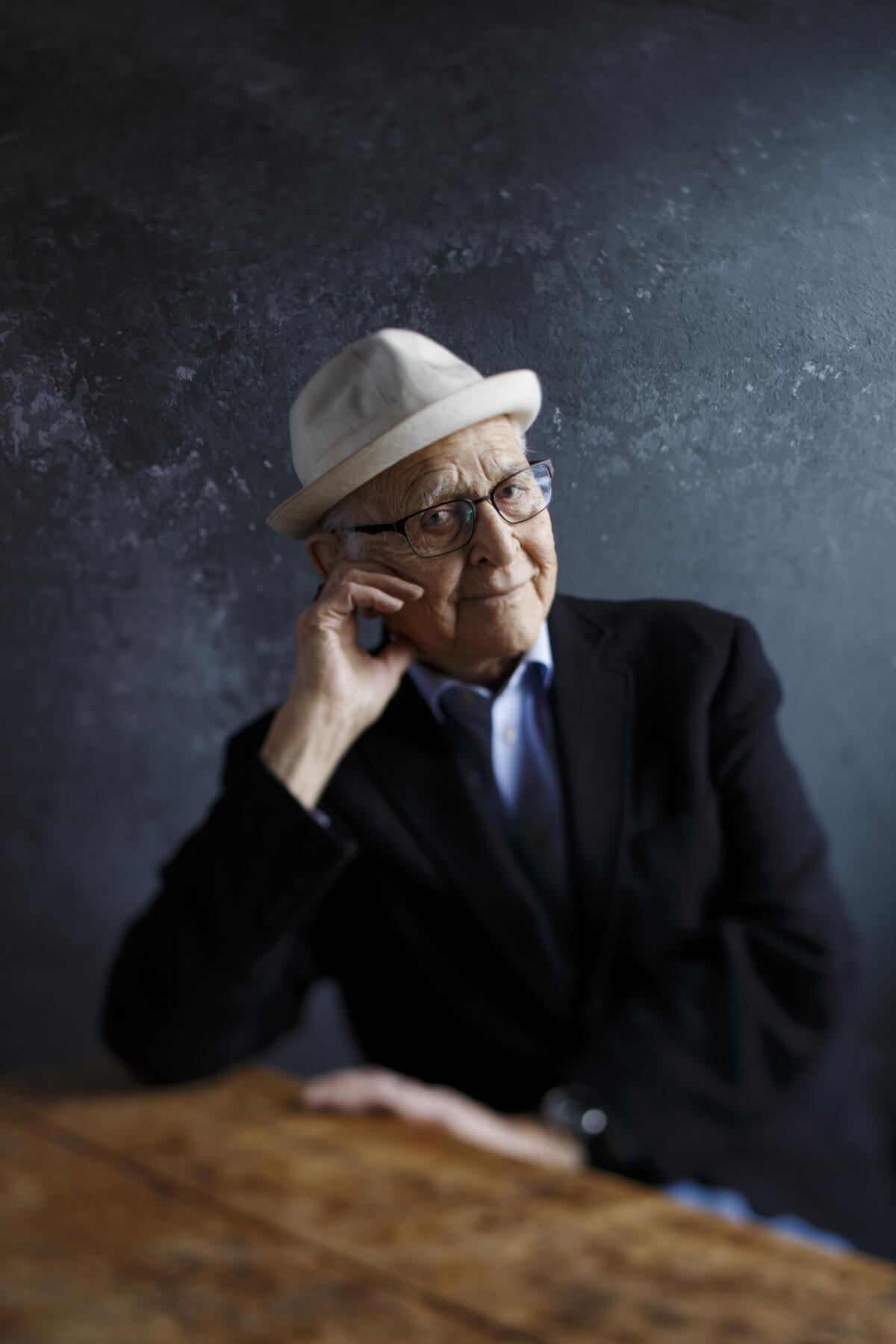
By then, a third set of young actors had been brought in to play the Bunkers’ daughter, Gloria, and Gloria’s ultra-liberal college-student husband, Mike Stivic (“Meathead” to Archie): Sally Struthers and Rob Reiner.
The chemistry among the four, Lear later said, “was made in heaven.”
The debut episode featured Archie in all his glory as he used racial epithets never before heard on network TV. The loud and malapropism-prone Archie also touched on subjects such as atheism, the virtues of premarital celibacy, the breakdown of law and order, long hair on boys and short skirts on girls.
In his comedies, Norman Lear made disagreement a form of patriotism. Now, the society he depicted is so polarized that love of debate seems quaint.
At one point, Archie launched into a heated argument with his son-in-law Mike over whether Black people had been denied their share of the American dream.
Mike: Now I suppose you’re going to tell me that the Black man has had the same opportunity in this country as you.
Archie: More — he’s had more! I didn’t have no million people out there marching and protesting to get me my job.
Edith: No, his uncle got it for him.
Some viewers denounced “All in the Family” as vulgar and trashy, while others panned the program as humorless and potentially contributing to the bigotry it was spoofing.
But the vast majority of those who tuned in welcomed a situation comedy that dealt with real-time issues in an honest way — and did it with superior comedy writing and a stellar cast.
By May 1971, “All in the Family” was, in Lear’s words, “red hot” and rising in the ratings. That same month, it won three Emmy Awards, including those for outstanding new series and outstanding comedy series.
For five consecutive seasons — from October 1971 to April 1976 — “All in the Family” was the No. 1-rated program. In all, the show would earn four Emmys for outstanding comedy series, and Lear would win a 1977 Peabody Award “for giving us comedy with a social conscience.”
Years later in a 2022 New York Times opinion piece on his 100th birthday, Lear reflected on how his signature character would have reacted to post-President Trump America.
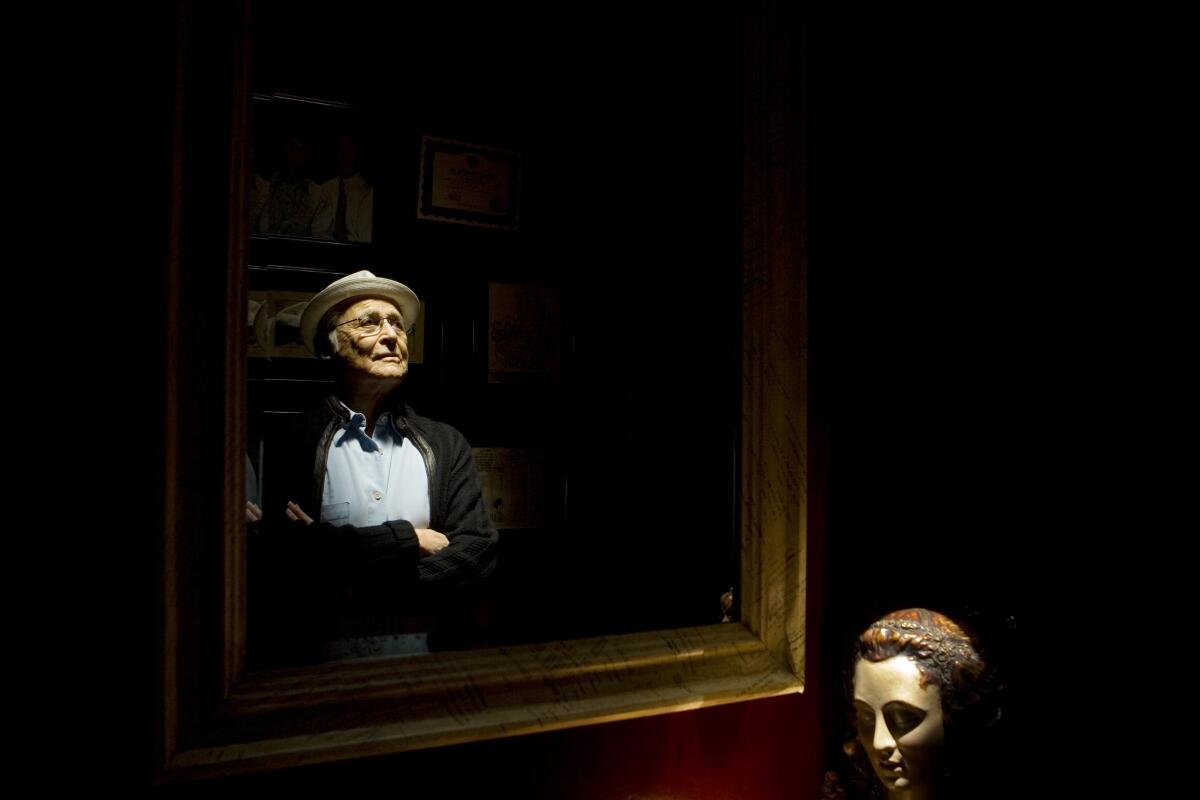
“If Archie had been around 50 years later, he probably would have watched Fox News. He probably would have been a Trump voter,” Lear wrote. “But I think that the sight of the American flag being used to attack Capitol Police would have sickened him. I hope that the resolve shown by Representatives Liz Cheney and Adam Kinzinger, and their commitment to exposing the truth, would have won his respect.”
“All in the Family” led to successful spinoff series that also tackled socially relevant and sometimes controversial subjects: “Maude,” starring Bea Arthur as the ultra-liberal title character and Bill Macy as her husband; and “The Jeffersons,” starring Sherman Hemsley and Isabel Sanford as a successful Black couple living in a high-rise apartment on Manhattan’s East Side.
“Maude,” in turn, spawned “Good Times,” starring Esther Rolle and John Amos as a financially struggling Black couple and their three children living in Chicago’s South Side.
There were other series, including “Sanford and Son,” “One Day at a Time” and “Mary Hartman, Mary Hartman,” a groundbreaking satirical soap opera starring Louise Lasser that ran in late-night syndication after all three networks turned it down.
But none had the impact of “All in the Family.”
Musing on the series’ legacy in a 2002 interview with The Times, Lear said: “People always say, ‘Did it change anything?’ I can’t say. But when people turned the shows off, conversation ensued.”
The grandson of Russian Jewish immigrants, Lear was born July 27, 1922, in New Haven, Conn.
His father, an extroverted and affectionate man with a penchant for get-rich-quick schemes, caused an unexpected trauma to the family in the summer of 1931 when he was arrested on suspicion of receiving and attempting to sell fake bonds to a Boston brokerage house. Convicted, he was sentenced to three years in prison.
After subsequently living in Brooklyn, N.Y., nearly four years, the family returned to Hartford, where Lear wrote a humor column and served as features editor on his high school newspaper. He also wrote a class play.
Lear was attending Emerson College in Boston, with the intention of majoring in journalism, when he enlisted in the Army Air Forces in 1942 during World War II. He flew 52 missions as a radio operator and gunner on a B-17 over Europe.
After the war, Lear landed a job with a Broadway publicity firm. But he quit after less than a year to work with his father in a short-lived business manufacturing electric hot plates and tea kettles.
In 1949, Lear and his first wife, Charlotte, and their young daughter, Ellen, moved to Los Angeles. While trying to find a publicity job, he sold home furnishings door-to-door with his cousin’s husband, Ed Simmons, who had come west to become a comedy writer.
One night, Lear helped Simmons finish writing a song parody, which they sold the same night to a nightclub entertainer for $40. Thus motivated, they continued spending their evenings together writing jokes, comedy routines and musical parodies.
In 1950, Lear and Simmons were hired to write for “Ford Star Revue,” a new NBC musical-comedy show broadcast from New York. Their sketch-writing quickly caught the attention of Jerry Lewis, and they soon were hired to write for Lewis and Martin on “The Colgate Comedy Hour.”
Lear and Simmons next wrote for “The Martha Raye Show,” on which Lear became a producer and a director. After he and Simmons went their separate ways, Lear wrote for Tennessee Ernie Ford’s musical-variety show and then was hired to write and produce George Gobel’s comedy-variety show.
With the great success of “All in the Family” and Tandem Productions’ other sitcoms in the ’70s, Lear became as widely known as the stars of his shows. The energetic producer was profiled on “60 Minutes” and invited to host “Saturday Night Live.” He also was named on President Nixon’s infamous “Enemies List.”
More than four decades later, in 2019, the 97-year-old Lear became the oldest person to win an Emmy Award, as one of the executive producers of “Live in Front of a Studio Audience: Norman Lear’s ‘All in the Family’ and ‘The Jeffersons,’” a live ABC special that re-created two episodes of the old shows with new casts.
But the fact that the title referred to “Norman Lear’s ‘All in the Family’ and ‘The Jeffersons’” resurrected criticism from Yorkin’s family and others, who maintain that Lear, as a 2019 article in The Times put it, had long failed to credit his former partner’s role in the success of Tandem Productions in interviews, his book and an “American Masters” documentary on Lear.
After reading The Times’ article, Lear told Variety that he now made sure to mention Yorkin in interviews. “Bud’s was the horse we rode in on,” he said.
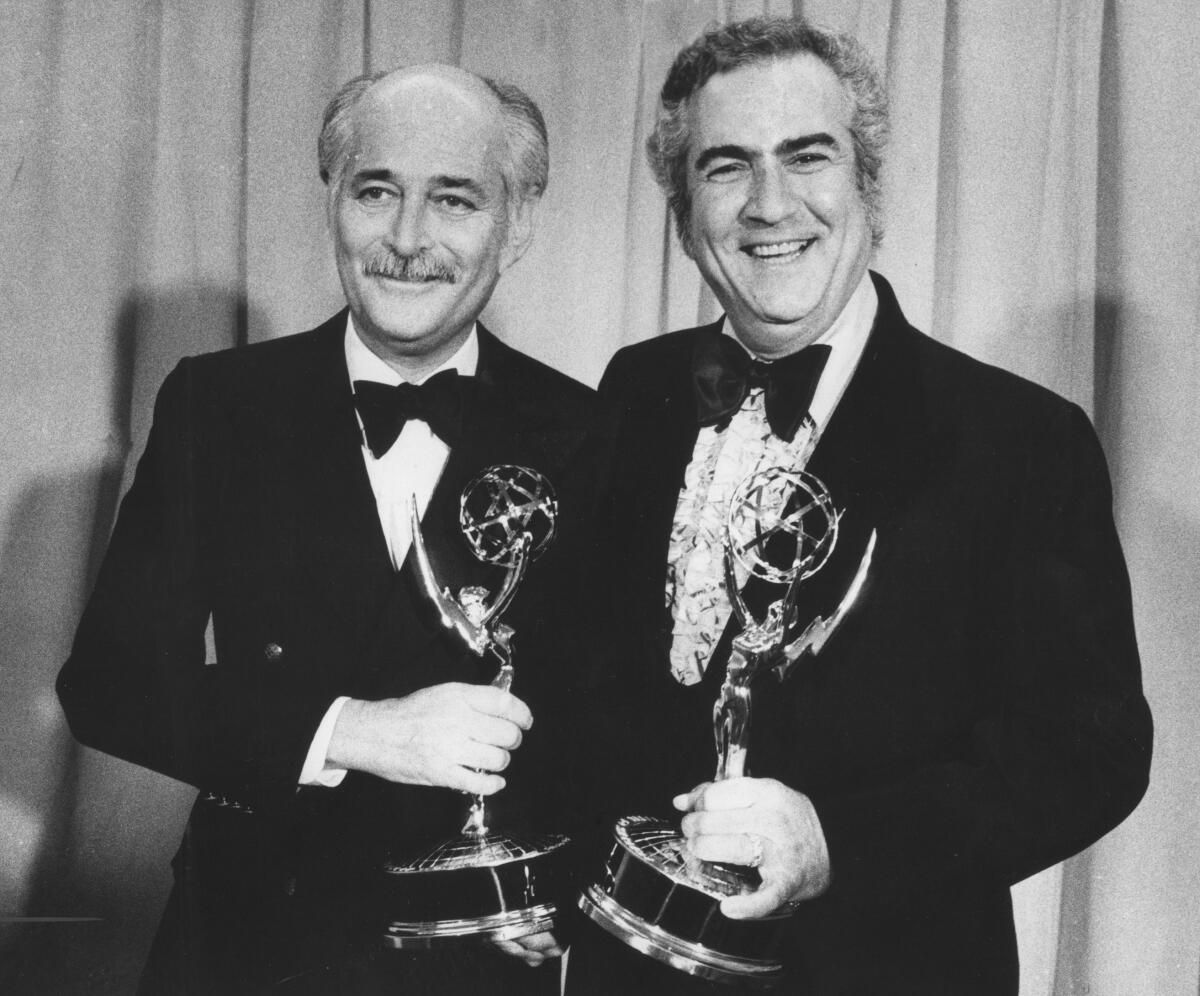
In 1978, Lear stepped down as production supervisor of his various shows, saying he wanted to “flex other creative muscles.”
Concerned by “the mixture of politics and religion, and the conviction that God is on your side in social and political matters,” he created a series of TV spots to counter what he believed was an effort to diminish Americans’ fundamental freedoms.
Lear had incurred the wrath of the religious right, which characterized him as a corrupter of American decency for injecting LGBTQ+ rights, abortion and other controversial topics into his comedy shows. The Rev. Jerry Falwell, the late leader of the Moral Majority, called Lear “the No. 1 enemy of the American family.”
In 1981, Lear and others founded People for the American Way, a nonprofit organization formed, according to Lear’s website, “to speak out for Bill of Rights guarantees and to monitor violations of constitutional freedoms.”
In 1982, Lear, Yorkin and their business partner A. Jerrold “Jerry” Perenchio purchased AVCO Embassy Pictures Corp. and made feature films and television series. Lear and Perenchio later sold it for a reported $485 million.
In 1984, the same year Lear was among the first seven inductees into the Television Academy Hall of Fame, he returned to television with the first all-Latino mainstream series: the short-lived sitcom about a Mexican American family, “a.k.a. Pablo,” starring stand-up comic Paul Rodriguez.
After Lear’s long marriage to his second wife, Frances — they had two daughters, Kate and Maggie — ended in divorce, he married Lyn Davis in 1987. They had three children: Benjamin and twins Madeline and Brianna. Lear is survived by his wife, six children and numerous grandchildren.
After the Embassy sale, Lear financed a new company, Act III Communications, which built a chain of movie theaters, a chain of independent TV stations and a string of trade publications. It also financed movies, including “Stand by Me” and “The Princess Bride,” which were directed by Rob Reiner. Act III later acquired Concord Records and other labels to form the Concord Music Group, which soon merged with Village Roadshow Pictures to form the Village Roadshow Entertainment Group.
Lear returned to television again in the early ’90s. But all three of his sitcoms — “Sunday Dinner,” “The Powers That Be” and “704 Hauser,” about a Black family living in the Bunkers’ old house — were short-lived.
In 2000, a $5-million gift from Lear launched the Norman Lear Center at the Annenberg School for Communication at USC. The multidisciplinary research and public policy center studies “the convergence of entertainment, commerce and society.”
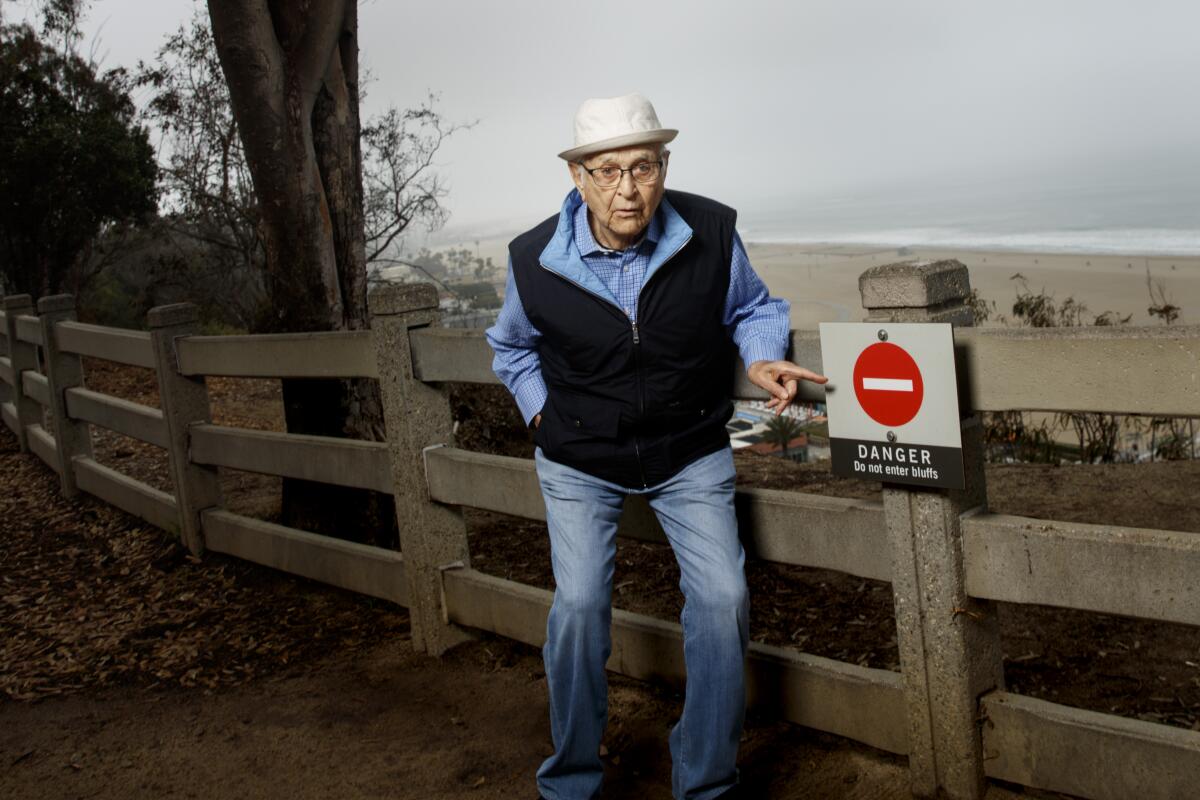
After Lear and his wife paid $8.1 million for a rare original copy of the Declaration of Independence in 2000, Lear launched what he called the “biggest production of my life”: a nationwide tour of the historical document, from 2001 until the presidential election of 2004.
Well into his 90s, Lear continued to stay active and receive awards for his life’s work, including a second Peabody Award in 2016.
Lear, whom a writer for the Christian Science Monitor once described as having “an expression halfway between a professor and a leprechaun,” said in his autobiography that of all the characters he had created and cast, the one who most resembled him was the outspoken Maude Findlay.
“That’s the character who shares my passion, my social concerns and my politics — not as articulately as the ‘professor’ in me would wish — still, pleading to be heard and understood.”
McLellan is a former Times staff writer. Former staff writer Steve Marble contributed to this report.
More to Read
Start your day right
Sign up for Essential California for the L.A. Times biggest news, features and recommendations in your inbox six days a week.
You may occasionally receive promotional content from the Los Angeles Times.

